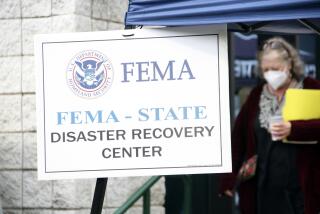A Surge of Scams Observed in Hurricane’s Wake
- Share via
WASHINGTON — Hurricane Katrina has spawned a second flood that is surging well beyond the Gulf Coast: thousands of complaints alleging fraud.
Almost two months after the storm roared ashore, authorities around the country are amassing cases including identity theft, scams by phony construction contractors and hotel-price gouging.
In Louisiana, dozens of victims have applied for benefits from the Federal Emergency Management Agency, only to find their personal identification information had been stolen and already used. In Texas, authorities say people falsely claiming to be refugees collected hundreds of dollars in emergency aid -- sometimes going back two or three times each day.
And in Mississippi, authorities are on the lookout for a woman who was charging victims $50 to use her “super-duper FEMA phone” -- which she said would let frustrated callers bypass busy signals on a direct hotline to the relief agency.
“There are some real oddball cases,” said Mississippi Assistant Atty. Gen. Grant Hedgepeth, who heads the state’s consumer protection office. Mississippi investigators have received more than 1,000 complaints -- about hotel- and gas-price gouging, phony insurance adjuster scams, people posing as FEMA workers to collect victims’ personal information.
The Red Cross is investigating more than 500 fraud cases, said spokeswoman Devorah Goldburg. And as of Thursday, the Justice Department had charged 34 people with various fraud crimes stemming from Katrina and Hurricane Rita.
An estimated 1.5 million people evacuated their homes in Louisiana, Mississippi and Alabama when Katrina hit Aug. 29, and Congress has approved $62 billion in disaster relief aid.
The big payout, combined with the scattering of victims to so many states, created the potential for rampant fraud in Katrina’s aftermath, said Jeannette M. Adkins, executive director of the National Organization of Victim Assistance.
Scam artists “can show up to disaster-relief centers in almost every state and present themselves as victims, and have nothing to show for it,” Adkins said. “And people are handing out the money.”
Although the number of federal cases is still relatively small, officials say the prosecutions reflect a more aggressive effort by the government to curb fraud than there was after the Sept. 11 terrorist attacks.
The federal government prosecuted 13 people accused of fraudulently seeking aid from the September 11th Victims Compensation Fund and New York City, according to the Justice Department’s inspector general. Focused on preventing more terror attacks, the department left nearly all Sept. 11 fraud cases to local and state prosecutors.
With Katrina, the federal government created an anti-fraud task force the week after the storm hit to curb con artists and contractors trying to cheat the system.
The goal is to make sure that money from the relief effort “doesn’t end up in the pockets or wallets of defrauders,” said Assistant Atty. Gen. Alice S. Fisher, who heads the task force of investigators from 35 agencies.
Nearly all the federal cases target people posing as displaced hurricane victims. Some are charged with applying for FEMA and Red Cross aid using stolen identity information. Others are accused of contriving tragic scenarios to blend in with victims who lost all documentation of their properties.
Two people in Los Angeles are accused of posing as charity officials to collect money from trusting donors. A Miami-area man allegedly solicited donations through his website by promising to help evacuate children and critically ill patients from Louisiana.
The bulk of the cases are surfacing at state and local levels.
In Houston, police arrested 54 people over a six-day period last month, accusing them of illegally collecting Red Cross benefits from a Baptist church.
“Some people were bold enough to come through three times a day,” said Houston Police Lt. Craig Williams, who estimated that up to 7,000 Katrina victims and impostors collected aid at the church daily.
Victims were eligible for $360 individually, or $1,565 for a family of five -- and “everybody was claiming they had five kids,” he said.
Investigators for Louisiana’s attorney general are looking into more than 2,200 complaints about gas stations and hotels trying to take advantage of desperate families by raising prices, said spokeswoman Jennifer Cluck. In Mississippi, Hedgepeth said some hotel prices skyrocketed from nightly rates of $49 to $135. Even a Louisiana campground got into the price-gouging game, Cluck said: Evacuees were charged $900 in monthly fees.
As the immediate emergency for evacuees subsides, authorities anticipate scammers will find new ways to defraud victims. Construction contracts are being watched closely by federal, state and local prosecutors. Roofers are under particular scrutiny in Louisiana, which has seen a spate of cases in which little or no work gets done after scammers receive upfront payments.
“We’ll probably start seeing some new trends as people look to get back into their homes and restart their lives,” Cluck said.
More to Read
Sign up for Essential California
The most important California stories and recommendations in your inbox every morning.
You may occasionally receive promotional content from the Los Angeles Times.










